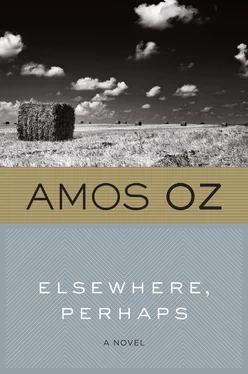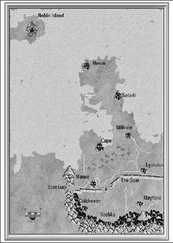And what about Siegfried? Siegfried's letter is rather strange, brimming with an odd joy. Has peace finally come to your land? A curse on the enemies of Israel who do not let us find our redemption quietly. Look after yourselves. Wouldn't it be better for our dear Einav to move away from the border till she's had her child? We have a brother in the capital who would be happy to look after her. Think over my advice. Everything is flowing smoothly here. I'm doing good business and "pouring out my wrath on the Gentiles." I've taken on an ex-Gestapo officer as a doorman. You would be as happy as I am if you could only see him bowing and scraping. I'm so happy to have my enemies in my power. Revenge is certainly sweet. Sweeter than honey. I've got the gold and silver now, and they all dance attendance on me, with " Jawohl, Herr Berger," "Bitte, Herr Berger," "Danke, Herr Berger," "Wunderbar, Herr Berger. " When I see you in a few weeks' time I'll tell you all about it, and we can enjoy the enemy's humiliation together. There is justice in this world, that's what I say, even if our national poet Bialik isn't right when he says "justice will be done when I depart this world." Here am I, the son of a Polish-Jewish cantor who was burned in the furnaces of Sobibor, lording it over the son of a Prussian Junker, the grandson of a Prussian Junker, the great-grandson of the Devil himself, and he is grateful to me for paying him a couple of pence more than doormen get paid in other clubs. It's a miracle, that's what I say. Signs and wonders, mighty hand and outstretched arm! Incidentally, Hamburger has just bought another car. He's got two now, one for himself and one for his wife. What a pity that he's so blinded by wealth he can't see the wonder of it. He's also taken on a liveried chauffeur. Eva will tell you her news herself. I'll leave her some room.
Eva says thank you for the pretty picture. Here in Munich the weather is cold and rainy. The rain never stops. It has a certain beauty, but I feel sad when I remember the weather in the valley. Life is quiet and pleasant here. But no life is entirely free from sadness. And all sorts of strange thoughts. Be well. Tell me how Stella is getting on at school. Do you think Reuven would be good enough to cut off a lock of her hair and send it to me via you? Would you ask him? Please. I pray that my daughter won't hate me. Yours, Eva.
Ezra Berger reads the letter from his two brothers, the one in Germany and the other in Jerusalem, and thinks them over during one of the long silences between himself and his little friend. Amazing things happen. Wonders and miracles, as Zechariah says. Father used to say to us, love work and hate power and put your heart into everything you do. But nobody could say that Father put his heart into being a cantor. May he rest in perfect peace. When Nehemiah ran away to Lvov, to the university, Father went into mourning for him. When Ezra joined the movement and came to Palestine, Father said we all have our trials to bear. When Siegfried went off and became Siegfried, Father said it's a very sore trial. Two's company, three's a crowd, little Noga. There's a great truth in that. Pour out your wrath on the Gentiles, Zechariah said when he came here in 1948. That was his be-all and end-all. I remember a terrible argument he had with Nehemiah. I'm going to go back there, he said, and be a dirty Jew. A filthy Yid. That's what he said. Yes, I said, you're right, men aren't made of myrrh and frankincense, but you're my brother and you weren't born to be a scoundrel. Nehemiah's argument was different. Stay here, have lots of children. That's our revenge. Zechariah laughed and paraphrased an old saying. Their world stands on three things, he said, murder, fornication, and greed. Those are its three legs. I'm going to smash one or two of those legs, just as they smashed me. As our dear father used to say: Hate power, hate work, hate your enemies, and you'll float like pure oil on sewage. Our brother Zechariah said this, too, that day: a true Jew, gentlemen, must pierce the darkness and eat away the rotten foundations of the earth, as our national poet Bialik puts it. If they bruise our head, we must bruise their heel, and their heels are murder, profit, and debauchery. Murder is forbidden in the Torah, but even the Devil wouldn't stop me debauching them and bleeding their money out of them. So Zechariah went to Munich, and Nehemiah lives in Jerusalem. "It is better for me to die than to live." "Would God I had died for you." Those verses may be allegorical, or something, but they're not true. That's what I think, little Turquoise. Here am I sitting under my vine and under my fig tree, as the Bible says, and my wife as a fruitful vine by the sides of my house, and where's Ramigolski now? Ramigolski is a white skeleton without a wrapping. My fate has been better than Zechariah's, better than Nehemiah's, better than my friend Ramigolski's. My lot has been a happy one. But it doesn't matter. It doesn't mean a thing. I was thinking and I happened to talk aloud, like a man crying out when he dreams. Listen, Turquoise, my brother who lives in Germany can interpret dreams. Really. We didn't throw him in a pit and show his striped robe to our father. You don't understand? I'll explain. A: Who wears striped robes nowadays? Only the Arabs. B: Our father was burned. C: Our brother, who interprets dreams, doesn't feed the Gentiles; he pours out his wrath on them. D: Conclusion. There is no conclusion. The conclusion is that the analogy doesn't work, and it's best to forget about it, because I'm tired and it's half past midnight.
Between Ezra and Bronka there is silence.
Since they live in a small apartment, they sometimes accidentally touch or bump into one another. Then they look at each other. Bronka pales. Ezra mutters:
"Sorry."
Bronka does not ask. Ezra doesn't expect her to ask. All she ever asks is, for instance:
"Have you written to your brothers yet?"
And Ezra, as if weighing her words before he answers:
"Not yet. Maybe I'll have time on Saturday. We'll see."
Ezra spends most of his time in his truck. What little free time he has is divided between his friends the fishermen of Tiberias and his little friend, in the grove beside the swimming pool. It is surprising, in view of this, that he did not forget Bronka's birthday. On one of his journeys he bought her a pretty vase, and set it silently on her bedside table. As for Bronka, she did not refuse her present. As she buttoned up her housecoat, early in the morning, with her back to him, she said:
"Thank you. It was kind of you."
Ezra replied tersely:
"Yes."
Bronka said:
"Perhaps you could take the curtains down for me, too. They've got to be washed; they're all dusty."
And Ezra:
"Why not? May I stand on this chair, or must I go and borrow a stepladder from the stores?"
Every Sunday, the beginning of the week, Bronka lays at the foot of her husband's bed a clean, neatly folded shirt and pair of trousers. Every Friday she takes his dirty working clothes, turns the pockets inside out, and puts them in the laundry bag. And every night, when Ezra gets back from his journey, he finds a cup of tea waiting for him as usual on the table, covered with a saucer to keep it warm. Every three or four days Tomer visits his parents' house to see to the little garden. Oren empties the garbage bins every three days, provided his mother reminds him and provided he is not suffering from one of the dark moods that take hold of him from time to time for no apparent reason. And Einav, on those evenings when Bronka does not feel well, brings her her supper on a tray, covered with a white napkin. Recently, Bronka has been unwell for three days running. Ezra did not give up his second daily trip, but he bought his wife a book about symphonic music in Tel Aviv to take her mind off her illness and her thoughts.
Читать дальше












